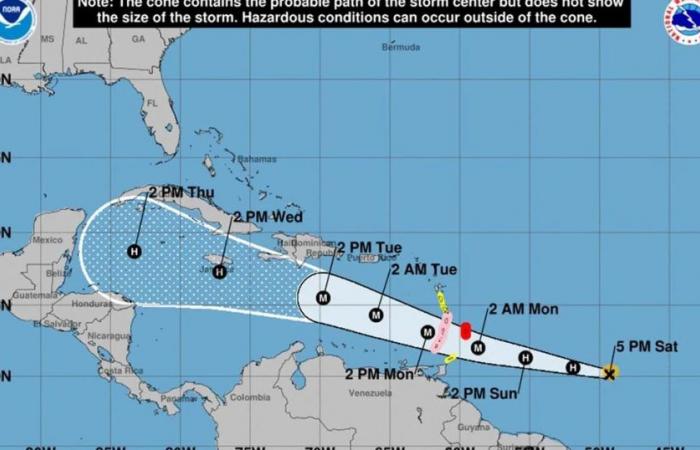The second tropical storm of 2024 in the Atlantic basin, named Berylbecame Category 1 hurricane this Saturday and could “rapidly strengthen” when it reaches the Windward Islands in the Caribbean Sea on Sunday night or Monday, the US National Hurricane Center (NHC) announced.
The NHC, based in Miami, Florida, noted that Beryl could cause “destructive hurricane-force winds and potentially life-threatening storm surge,” which is why there is a hurricane watch in effect for much of the Windward Islands.
The governments of France, Trinidad and Tobago, Saint Lucia and Barbados have issued a hurricane warning for their islands in the region.
“Heavy rain and localized flooding are expected in the Windward Islands Sunday night and Monday“, added the statement from the meteorological institution.
This is the second named storm of the 2024 Atlantic hurricane season and formally became a tropical storm on Friday.
Barbados and other Eastern Caribbean States also issued a hurricane warning this Saturday ahead of the passage of Beryl.
Barbadian Prime Minister Mia Mottley urged citizens on national television to take all necessary precautions in anticipation of the storm, saying the country could face a “category one hurricane within the next 48 hours.”
“Whether we like it or not, the truth is that we are living in a different time. You hear me talk about climate change and the climate crisis, and this is where the finger is put on the sore spot, and the truth is that we will experience more and more moments like this,” said the president. In her opinion, “These swells are likely to cause life-threatening waves and rip currents.”
“Temperatures are rising not just for us, but also in the oceans, and when they start to rise in the oceans, the chances of storms and hurricanes will only increase,” Mottley said.
On the other hand, the National Meteorological Service of Mexico (SMN) reported this Saturday that tropical storm Beryl, which is positioned over the Mexican southeast, It does not represent risks for the country, although it will cause torrential to heavy rains in 29 states.
On Friday night, in the Atlantic Ocean, tropical depression ‘Two’ intensified into a tropical storm named Beryl. “At the moment it does not represent a risk for Mexico,” said the SMN. In addition, he explained that the low pressure zone, associated with tropical wave six, will be located over the Sonde of the southern state of Campeche towards the coast of Veracruz.
He explained that this low pressure zone has a 40% chance of developing a tropical cyclone in 48 hours, as well as interacting with the humidity generated by the monsoon trough. This will lead to occasional torrential rains in Chiapas, Campeche, Yucatán and Quintana Roo and intense occasional rains in Veracruz, Oaxaca and Tabasco. In turn, winds of 60 to 80 km/h are expected with the possible formation of waterspouts and waves of two to four meters high on the coasts of the Yucatan Peninsula.
This year, the Atlantic will have a well-above-average hurricane season, with the possibility of up to thirteen hurricanes, of which up to seven may be major, according to the National Oceanic and Atmospheric Administration (NOAA). of the United States.
The forecast reflects that This year a total of between 17 and 25 storms may formthat is, with maximum sustained winds above 62 kilometers per hour.
(With information from EFE)


